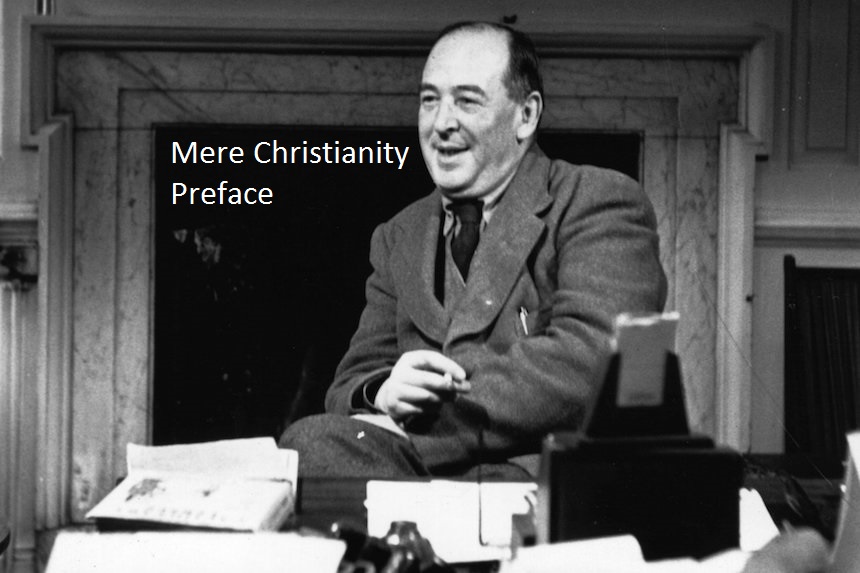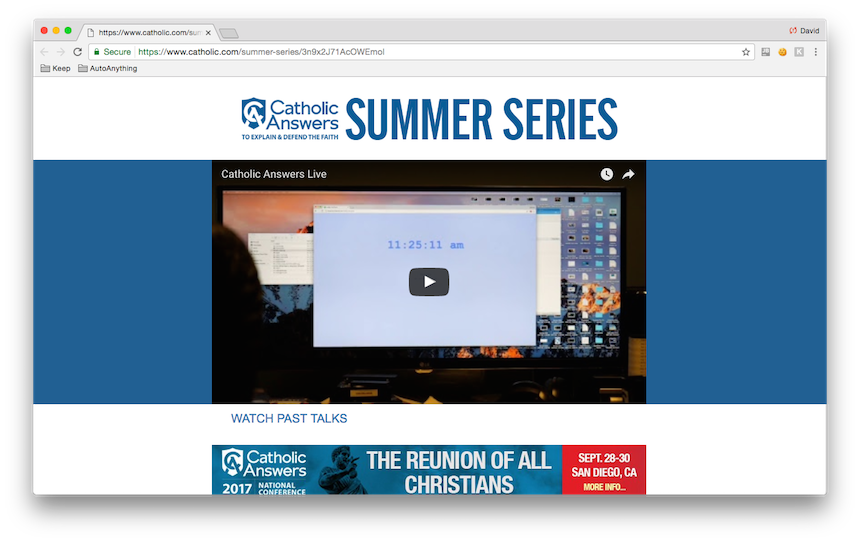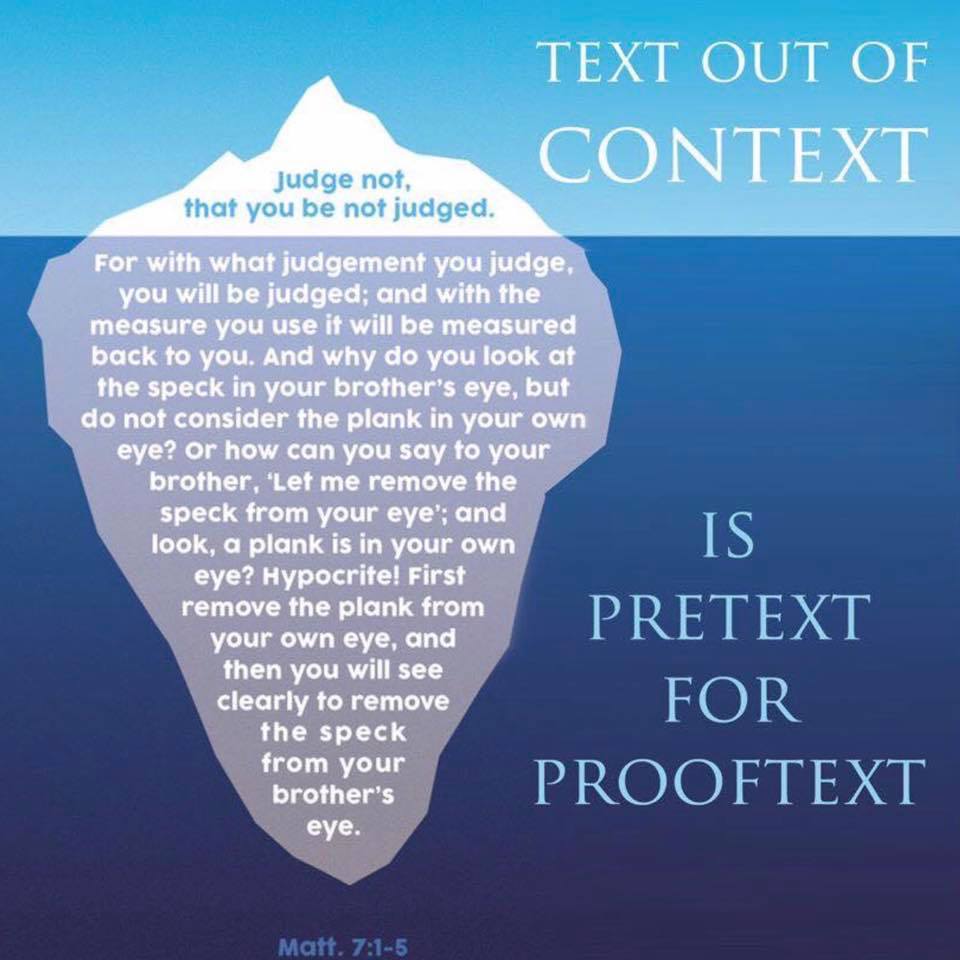Mere Christianity – Preface

As I mentioned yesterday, I will be publishing my notes as I read through “Mere Christianity” by CS Lewis.
Notes & Quotes
Today I am working through the Preface where CS Lewis (“Jack”) speaks about the book itself…
1. The book was based on a series of radio talks which were subsequently published in three separate parts.
2. We are told that this book will not be of help to anyone trying to decide between two denominations.
“…I have thought that the best…service I could do for my unbelieving neighbours was to explain and defend the belief that has been common to nearly all Christians at all times”
(a) Many of the issues relate to high theology or history and should only be tackled by experts.
“I should have been out of my depth in such waters: more in need of help myself than able to help others”
(b) Discussing disputed points doesn’t encourage non-Christians to convert
“Our divisions should never be discussed expect in the presence of those who have already come to believe that there is one God and that Jesus Christ is His only Son”
3. Instead, Jack is going to defend what Baxter calls ‘mere’ Christianity. Richard Baxter was a 17th century Anglican minister and uses the term in his book “The Saints’ Everlasting Rest”. When Jack refers to “Uncle Toby” in this section, he is referring to a character in “Tristam Shandy”, a book by Laurence Sterne. When asked about the duties of a marriage man, the book’s character replies that “they are written…in the Common-Prayer Book”.
“That part of the line where I thought I could serve best was also the part that seemed to be thinnest”
(a) In an effort to present a ‘mere’ Christianity, he sent the manuscript for Book II to a number of clergymen (Anglican, Methodist, Presbyterian, Roman Catholic).
“So far as I can judge…the book…did at least succeed in presenting an agreed, or common, or central, or ‘mere’ Christianity”
(b) Even this ‘mere’ Christianity was formidable… Jack uses the Latin phrase “Odium theologicum” which means “theological hatred”.
“…it may possibly be of some help in silencing the view that, if we omit the disputed points, we shall have left only a vague and bloodless [Highest Common Factor]. The H.C.F. turns out to be something not only positive but pungent”
(c) …which at least points to why we should be reunited
“If I have not directly helped the cause of reunion, I have perhaps made it clear why we ought to be reunited”
4. He asks his readers to refrain from speculation as to why he does not mention some disputed issues.
“I should be very glad if people would not draw fanciful inferences from my silence on certain disputed matters”
(a) This is because sometimes…
(i) …he is sitting on the fence…
“There are questions at issue between Christians to which I do not think we have been told the answer”
(ii) …but other times he is not.
(b) You cannot conclude whether or not he thinks the matter important
“…you cannot even conclude, from my silence on disputed points, either that I think them important or that I think them unimportant. For this is itself one of the disputed points”
(c) He doesn’t want to talk about issues with which he has no experience
“I have a reluctance to say much about temptations to which I myself am not exposed. No man, I suppose, is tempted to every sin. It so happens that the impulse which makes men gamble has been left out of my make-up; and, no doubt, I pay for this by lacking some good impulse of which it is the excess or perversion”
6. Two particular disputed matters are mentioned
(a) The Blessed Virgin Mary
“The Roman Catholic beliefs on that subject are held not only with the ordinary fervour that attaches to all sincere religious belief, but…with…chivalrous sensibility that a man feels when the honour of his mother or his beloved is at stake…contrariwise…Protestant beliefs on this subject…it seems that the distinction between Creator and creature (however holy) is imperilled”
(b) Contraception
“I am not a woman nor even a married man, nor am I a priest. I did not think it my place to take a firm line about pains, dangers and expenses from which I am protected; having no pastoral office which obliged me to do so”
7. He addresses those who object to his use of the word “Christian”, who wish to use it more generally to those who are Christ-like
(a) Lewis shows how the word “gentleman” has been drained of all its meaning following a similar “deepening” of meaning
“When a word ceases to be a term of description and becomes merely a term of praise, it no longer tells you facts about the object: it only tells you about the speaker’s attitude to that object… A gentleman, once it has been spiritualised and refined out of its old coarse, objective sense, means hardly more than a man whom the speaker likes”
(b) If the term “Christian” refers to an interior disposition which we can never know, the word becomes useless
“…Christians themselves will never be able to apply it to anyone. It is not for us to say who, in the deepest sense, is or is not close to the spirit of Christ. We do not see into men’s hearts… And obviously a word which we can never apply is not going to be a very useful word”
“When a man who accepts the Christian doctrine lives unworthily of it, it is much clearer to say he is a bad Christian than to say he is not a Christian”
8. We are told that ‘mere’ Christianity is not a replacement for existing creeds, but is instead a hall
“It is more like a hall out of which doors open into several rooms”
(a) The goal is to get into a room
“…it is in the rooms, not in the hall, that there are fires and chairs and meals. The hall is a place to wait in, a place from which to try the various doors, not a place to live in”
(b) The room we entered shouldn’t be based on taste, but on truth
“…you must be asking which door is the true one; not which pleases you best by its paint and panelling…Are these doctrines true: Is holiness here?”
(c) We should be kind to those in other rooms and those in the hall
“…be kind to those who have chosen different doors and to those who are still in the hall. If they are wrong they need your prayers all the more; and if they are your enemies, then you are under orders to pray for them. That is one of the rules common to the whole house”
Discussion Questions
1. What do you think about Jack’s decision to not get into denominational disputes?
2. Do you think that ‘mere’ Christianity is sufficient?
3. What are the reasons he sometimes doesn’t mention controversial topics?
4. What do you make of his comments about contraception?
5. What analogy does Jack use to describe ‘mere’ Christianity and the different denominations? What advice does he give?

 At this point, I’ve given a few talks on the subject of the Blessed Mother (e.g.
At this point, I’ve given a few talks on the subject of the Blessed Mother (e.g. 


